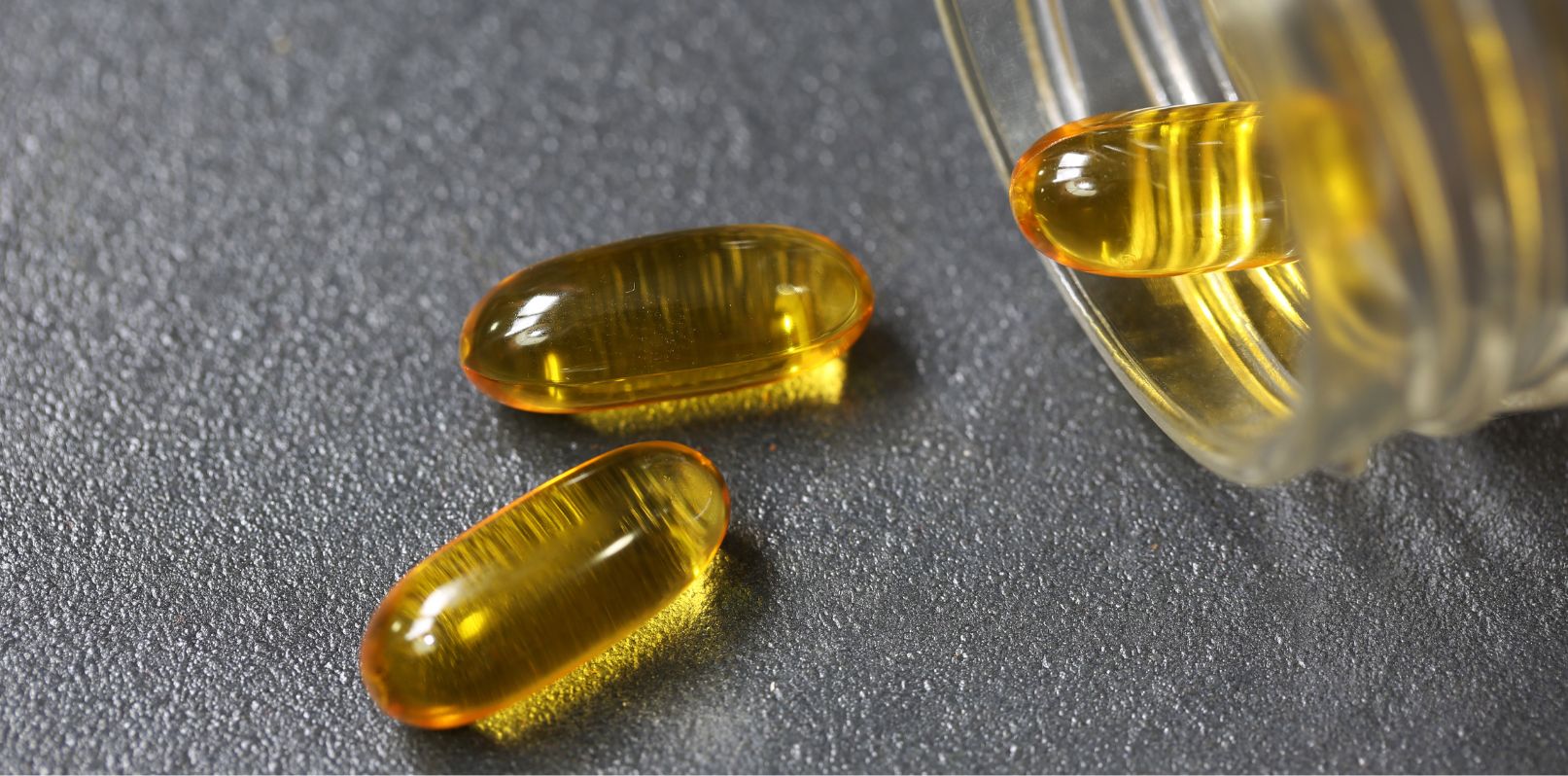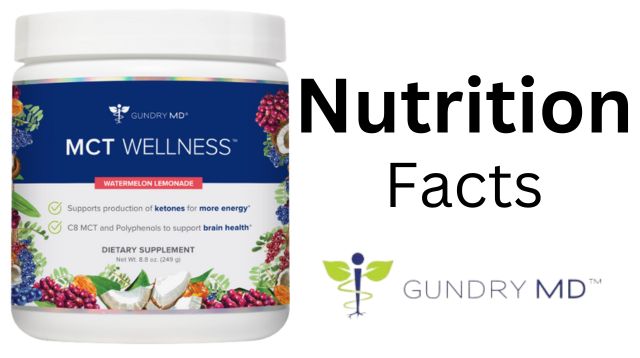A Complete Guide to MCT Oil Vs Omega-3 Fish Oil: Which is Best?

An Introduction To MCT Oil And Fish Oil

What Is MCT Oil?
MCT oil, short for Medium-Chain Triglyceride oil, is a type of fat primarily sourced from coconut oil. It’s more concentrated than coconut oil and contains only coconut oil’s most potent MCTs – typically caprylic acid (C8) and capric acid (C10), or C8 alone.1
This oil is unique, as MCTs are typically easier to digest than LCTs (long-chain triglycerides, which are found in fish, avocados, and dairy). As we’ll explore, this is where MCT oil can be a real stand-out.2
MCT oil has shown an array of exciting potential health benefits and can most commonly be found in liquid or powder form.
What Is Omega-3 Fish Oil?
Omega-3 fish oil is a dietary supplement derived from the tissues of fatty fish, such as salmon, mackerel, and sardines. It contains high concentrations of essential omega-3 fatty acids.3
The two primary omega-3 fatty acids found in fish oil are eicosapentaenoic acid (EPA) and docosahexaenoic acid (DHA). Research shows that these polyunsaturated fats are crucial for supporting various aspects of human health.4
Omega-3 fish oil is commonly available in capsules or liquid supplements.
MCT Oil Vs Fish Oil: The Ultimate Comparison
1. MCT Oil vs Fish Oil: Basic Nutritional Info
Let’s start by taking a look at the basic nutritional properties of MCT Oil in comparison to fish oil.
MCT Oil:
- MCT oil contains fast-acting MCTs, typically a blend of caprylic acid (C8) and capric acid (C10), or just C8.5
- MCTs are classified as saturated fat but don’t act like a traditional “unhealthy” saturated fat because they’re more rapidly metabolized.6
Fish Oil:
- Fish oil is packed full of the omega-3 fatty acids eicosapentaenoic acid (EPA) and docosahexaenoic acid (DHA).
- Omega-3s are a healthy, long-chain polyunsaturated fatty acid.
- Fish oil usually contains vitamins A and D.
- Some fish oil also contains high levels of healthy long-chain monounsaturated fatty acids.7-9
2. MCT Oil Vs Fish Oil: Calorie Content
When looking at the calorie content of both MCT and fish oil, you’ll see that they are almost identical. They also come in on par for fat content.
MCT Oil:
- Calories: One tablespoon of MCT oil contains approximately 120 calories.
- Fat: MCT oil has around 14 grams of fat per tablespoon.10
Fish Oil:
- Calories: The average tablespoon of fish oil offers around 123 calories.
- Fat: Fish oil has around 14 grams of fat per tablespoon.11
3. MCT Oil Vs Fish Oil: Medium-Chain Triglycerides Vs Long-Chain Triglycerides
Medium-chain triglycerides (MCTs) are fats with a chain length of 6-12 carbon atoms, sourced predominantly from foods like coconut oil. They're utilized in the body quite differently than long-chain triglycerides (LCTs), such as those found in fish oil, which contain 13-21 carbon atoms.12
You see, MCTs are more quickly absorbed and converted into potential energy – making MCT oil popular for those who seek the possibility of fast-acting results.13
Although LCTs in fish oil are processed a little more slowly, they have their own unique and potentially beneficial long-term health properties, as we’ll explore next.
Health Benefits: MCT Oil Vs Fish Oil
Now that we’ve explored the basics of both oils, let’s take a look at what’s really important – the potential health benefits of each.
Potential Benefits Of MCT Oil
- Weight Management: Research suggests that MCT oil may lead to greater energy expenditure than LCTs. It also has a high burn rate, which may help boost the number of calories burned after meals.14
- Brain Health: MCT oil can help stimulate the production of ketones, a highly efficient energy source for the brain. These ketones have shown a promising ability to support normal brain function.15-17
- Energy and Focus: MCT oil may be beneficial as a fast source of energy because it’s so quickly absorbed into the bloodstream. As MCTs can be converted into ketones, they might provide more efficient brain energy to help support focus.18,19
- Blood Sugar Levels: MCT oil may help support healthy blood sugar levels.20

Potential Benefits Of Fish Oil Omega-3 Fatty Acids
- Heart Health: Omega-3 fatty acids have shown potential to help support heart health by promoting a healthy heart rate, blood pressure, and triglyceride levels.
- Brain Health: Omega-3s are vital for brain development and function. They may help support cognitive function and memory, for example.
- Eye Health: DHA, one of fish oil’s omega-3 fatty acids, is a major structural component of the retina. Consuming omega-3s might help support eye health.
- Fetal Health: Omega-3s are also important for pregnant and breastfeeding women, as they can help support the development of a baby’s nervous system.21,22
MCT Oil Vs Fish Oil: Which Oil Is Right For You?
Here’s the clincher – both oils offer unique and diverse potential benefits. A healthy diet should consist of a wide range of foods (including fatty acids), and that means there’s room for both MCT oil and fish oil.
The American Heart Association recommends eating 2 servings of fish (particularly these fatty, oily fish) per week. Fatty fish include anchovies, herring, black cod, Alaskan salmon, sardines, canned tuna, whitefish, freshwater bass, and cobia – all are exceptionally high in omega-3 fatty acids.23
How To Incorporate MCT Oil And Fish Oil Into Your Diet
You know that both MCT oil and omega-3-rich fish oil may offer potential benefits for your overall health and well-being. Now, let’s take a look at how to incorporate them into a healthy, balanced diet.
Here are some suggestions:
1. MCT Oil
Add a serving of MCT oil or MCT oil powder to:
- Coffee: One popular way to consume MCT oil is by adding it to your coffee, where it creates a frothy, creamy texture.
- Smoothies and protein shakes: Add MCT oil to your favorite smoothie or post-workout protein shake.
- Salad Dressings: Use MCT oil as a base for homemade salad dressings, mixed with vinegar, herbs, and spices.
- Drizzle: Drizzle MCT oil over dishes like roasted vegetables or grilled meats for added nutrition.
Note: It's important to start with a small amount of MCT oil and gradually increase the amount as your body becomes better accustomed to it.
2. Fish Oil
Here's how to incorporate fish oil into your diet:
- Fatty Fish: Aim to consume fatty fish at least twice a week. Grill, bake, or steam the fish to help retain its nutritional value.
- Omega-3 or DHA Supplements: If it's challenging to get enough omega-3s through your diet, consider taking high-quality fish oil supplements.

Key Takeaways: MCT Oil Vs Omega-3 Fish Oil
As you’ve seen, both MCT oil and fish oil may offer beneficial impacts on your health when taken as recommended.
However, it's essential to also maintain a balanced diet that includes a wide variety of nutrient-dense foods and plenty of physical activity.
Finally, always consult with a registered healthcare professional before adding any new supplement to your diet.
Sources
- https://www.healthline.com/nutrition/mct-oil-vs-coconut-oil#mc-ts
- https://www.health.harvard.edu/blog/is-there-a-place-for-coconut-oil-in-a-healthy-diet-2019011415764
- https://www.hsph.harvard.edu/nutritionsource/what-should-you-eat/fats-and-cholesterol/types-of-fat/omega-3-fats/
- https://www.ncbi.nlm.nih.gov/pmc/articles/PMC4882694/
- https://www.healthline.com/nutrition/saturated-fat-types#TOC_TITLE_HDR_8
- https://www.hsph.harvard.edu/nutritionsource/what-should-you-eat/fats-and-cholesterol/types-of-fat/omega-3-fats/#:~:text=Omega%2D3%20fats%20are%20a,sometimes%20called%20marine%20omega%2D3s.
- https://www.healthline.com/nutrition/benefits-of-fish-oil#TOC_TITLE_HDR_2
- https://www.ncbi.nlm.nih.gov/pmc/articles/PMC5120510/
- https://www.nestlehealthscience.ca/en/brands/mct-oil/mct-oil
- https://fdc.nal.usda.gov/fdc-app.html#/food-details/173577/nutrients
- https://med.virginia.edu/ginutrition%20/wp-content/uploads/sites/199/2014/06/Parrish-February-17.pdf
- https://pubmed.ncbi.nlm.nih.gov/2021124/
- https://alz-journals.onlinelibrary.wiley.com/doi/abs/10.1002/alz.055702
- https://pubmed.ncbi.nlm.nih.gov/33220329/
- https://www.frontiersin.org/articles/10.3389/fneur.2023.1123290/full
- https://www.sciencedirect.com/science/article/abs/pii/S0031938420305667
- https://www.ncbi.nlm.nih.gov/pmc/articles/PMC4669977/
- https://pubmed.ncbi.nlm.nih.gov/1568535/
- https://ods.od.nih.gov/factsheets/Omega3FattyAcids-HealthProfessional/#alzheimer
- https://www.nhs.uk/live-well/eat-well/food-types/fish-and-shellfish-nutrition/#:~:text=Oily%20fish%20and%20omega%2D3,long%2Dchain%20omega%2D3.
- https://www.heart.org/en/healthy-living/healthy-eating/eat-smart/fats/fish-and-omega-3-fatty-acids
Related posts


